人教版(新目标)初中英语八年级下册Unit 3 预习自学
初中英语人教版八年级下册Unit3 Grammar Focus
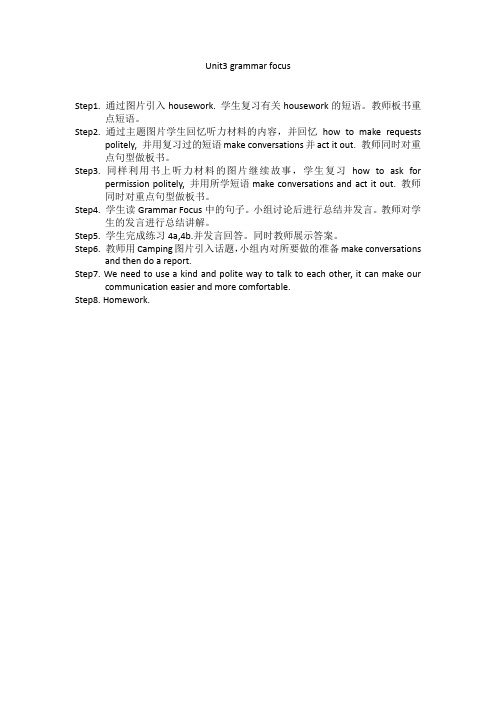
Unit3 grammar focus
Step1. 通过图片引入housework. 学生复习有关housework的短语。
教师板书重点短语。
Step2. 通过主题图片学生回忆听力材料的内容,并回忆how to make requests politely, 并用复习过的短语make conversations并act it out. 教师同时对重点句型做板书。
Step3. 同样利用书上听力材料的图片继续故事,学生复习how to ask for permission politely, 并用所学短语make conversations and act it out. 教师同时对重点句型做板书。
Step4. 学生读Grammar Focus中的句子。
小组讨论后进行总结并发言。
教师对学生的发言进行总结讲解。
Step5. 学生完成练习4a,4b.并发言回答。
同时教师展示答案。
Step6. 教师用Camping图片引入话题,小组内对所要做的准备make conversations and then do a report.
Step7. We need to use a kind and polite way to talk to each other, it can make our communication easier and more comfortable.
Step8. Homework.。
初中英语 新目标(Go for it)版 八年级下 Unit 3 Could you pleas
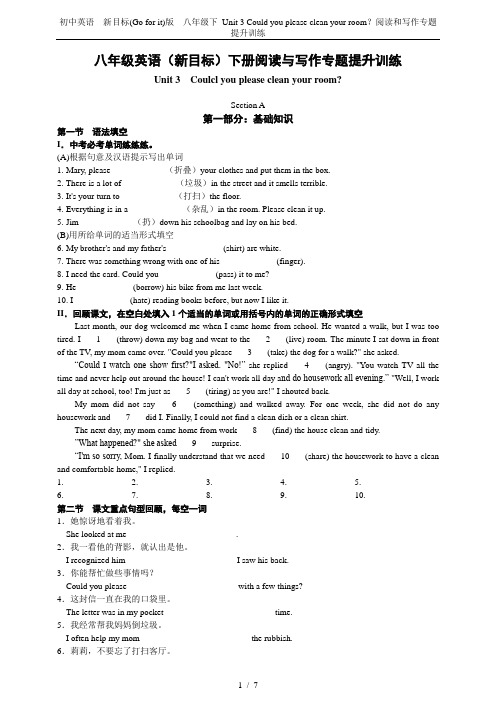
八年级英语(新目标)下册阅读与写作专题提升训练Unit 3 Coulcl you please clean your room?Section A第一部分:基础知识第一节语法填空I.中考必考单词练练练。
(A)根据句意及汉语提示写出单词1. Mary, please ____________(折叠)your clothes and put them in the box.2. There is a lot of ____________(垃圾)in the street and it smells terrible.3. It's your turn to ____________(打扫)the floor.4. Everything is in a ____________(杂乱)in the room. Please clean it up.5. Jim ____________(扔)down his schoolbag and lay on his bed.(B)用所给单词的适当形式填空6. My brother's and my father's ____________ (shirt) are white.7. There was something wrong with one of his ____________ (finger).8. I need the card. Could you ____________ (pass) it to me?9. He ____________ (borrow) his bike from me last week.10. I ____________ (hate) reading books before, but now I like it.II.回顾课文,在空白处填入1个适当的单词或用括号内的单词的正确形式填空Last month, our dog welcomed me when I came home from school. He wanted a walk, but I was too tired. I ___1___ (throw) down my bag and went to the ___2___ (live) room. The minute I sat down in front of the TV, my mom came over. "Could you please ___3___ (take) the dog for a walk?" she asked.“Could I watch one show first?"I asked. "No!”she replied ___4___ (angry). "You watch TV all the time and never help out around the house! I can't work all day a nd do housework all evening.” "Well, I work all day at school, too! I'm just as ___5___ (tiring) as you are!" I shouted back.My mom did not say ___6___ (something) and walked away. For one week, she did not do any housework and ___7___ did I. Finally, I could not find a clean dish or a clean shirt.The next day, my mom came home from work ___8___ (find) the house clean and tidy.”What happened?" she asked ___9___ surprise.“I'm so sorry, Mom. I finally understand that we need ___10___ (share) the housework to have a clean and comfortable home," I replied.1. ____________2. ____________3. ____________4. ____________5. ____________6. ____________7. ____________8. ____________9. ____________ 10. ____________第二节课文重点句型回顾,每空一词1.她惊讶地看着我。
初中英语人教新目标八年级下册Unit 3 SectionA预习指导(知识点+练习题)
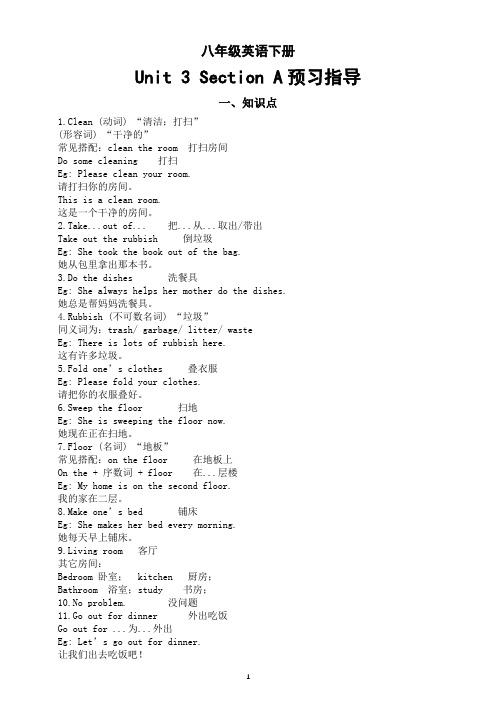
八年级英语下册Unit 3 Section A预习指导一、知识点1.Clean (动词) “清洁;打扫”(形容词) “干净的”常见搭配:clean the room 打扫房间Do some cleaning 打扫Eg: Please clean your room.请打扫你的房间。
This is a clean room.这是一个干净的房间。
2.Take...out of... 把...从...取出/带出Take out the rubbish 倒垃圾Eg: She took the book out of the bag.她从包里拿出那本书。
3.Do the dishes 洗餐具Eg: She always helps her mother do the dishes.她总是帮妈妈洗餐具。
4.Rubbish (不可数名词) “垃圾”同义词为:trash/ garbage/ litter/ wasteEg: There is lots of rubbish here.这有许多垃圾。
5.Fold one’s clothes 叠衣服Eg: Please fold your clothes.请把你的衣服叠好。
6.Sweep the floor 扫地Eg: She is sweeping the floor now.她现在正在扫地。
7.Floor (名词) “地板”常见搭配:on the floor 在地板上On the + 序数词 + floor 在...层楼Eg: My home is on the second floor.我的家在二层。
8.Make one’s bed 铺床Eg: She makes her bed every morning.她每天早上铺床。
9.Living room 客厅其它房间:Bedroom 卧室; kitchen 厨房;Bathroom 浴室;study 书房;10.No problem. 没问题11.Go out for dinner 外出吃饭Go out for ...为...外出Eg: Let’s go out for dinner.让我们出去吃饭吧!12.Go to the movies 去看电影类似词组:see the film 看电影Eg: They went to the movies last night.他们昨晚去看电影了。
人教版初中英语八年级下册Unit3 课文讲解知识点及练习
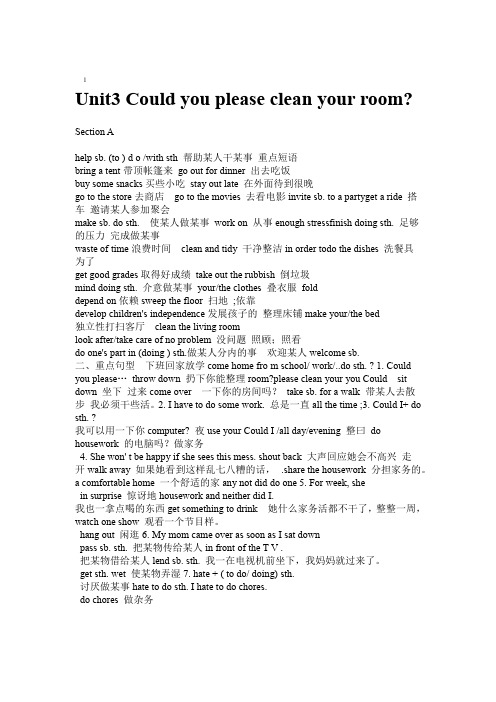
1Unit3 Could you please clean your room? Section Ahelp sb. (to ) d o /with sth 帮助某人干某事重点短语bring a tent带顶帐篷来go out for dinner 出去吃饭buy some snacks买些小吃stay out late 在外面待到很晚go to the store去商店go to the movies 去看电影invite sb. to a partyget a ride 搭车邀请某人参加聚会make sb. do sth. 使某人做某事work on 从事enough stressfinish doing sth. 足够的压力完成做某事waste of time浪费时间clean and tidy 干净整洁in order todo the dishes 洗餐具为了get good grades取得好成绩take out the rubbish 倒垃圾mind doing sth. 介意做某事your/the clothes 叠衣服folddepend on依赖sweep the floor 扫地;依靠develop children's independence发展孩子的整理床铺make your/the bed独立性打扫客厅clean the living roomlook after/take care of no problem 没问题照顾;照看do one's part in (doing ) sth.做某人分内的事欢迎某人welcome sb.二、重点句型下班回家放学come home fro m school/ work/..do sth. ? 1. Could you please…throw down 扔下你能整理room?please clean your you Could sit down 坐下过来come over 一下你的房间吗?take sb. for a walk 带某人去散步我必须干些活。
人教版新目标八年级英语下册第三单元第一课时教案设计
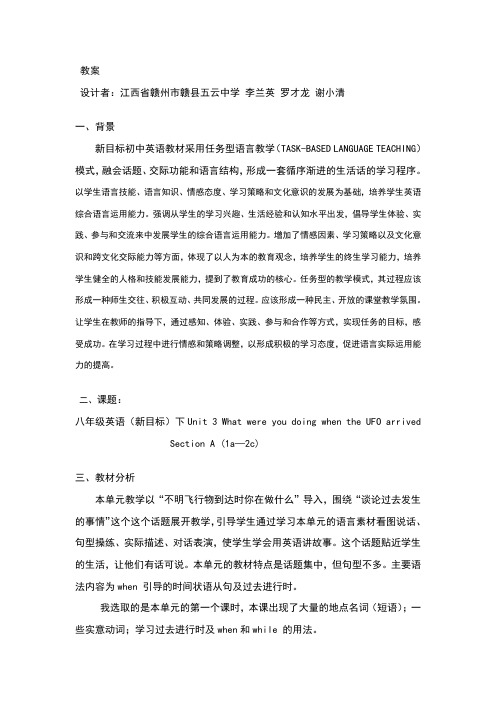
教案设计者:江西省赣州市赣县五云中学李兰英罗才龙谢小清一、背景新目标初中英语教材采用任务型语言教学(TASK-BASED LANGUAGE TEACHING)模式,融会话题、交际功能和语言结构,形成一套循序渐进的生活话的学习程序。
以学生语言技能、语言知识、情感态度、学习策略和文化意识的发展为基础,培养学生英语综合语言运用能力。
强调从学生的学习兴趣、生活经验和认知水平出发,倡导学生体验、实践、参与和交流来中发展学生的综合语言运用能力。
增加了情感因素、学习策略以及文化意识和跨文化交际能力等方面,体现了以人为本的教育观念,培养学生的终生学习能力,培养学生健全的人格和技能发展能力,提到了教育成功的核心。
任务型的教学模式,其过程应该形成一种师生交往、积极互动、共同发展的过程。
应该形成一种民主、开放的课堂教学氛围。
让学生在教师的指导下,通过感知、体验、实践、参与和合作等方式,实现任务的目标,感受成功。
在学习过程中进行情感和策略调整,以形成积极的学习态度,促进语言实际运用能力的提高。
二、课题:八年级英语(新目标)下Unit 3 What were you doing when the UFO arrived Section A (1a—2c)三、教材分析本单元教学以“不明飞行物到达时你在做什么”导入,围绕“谈论过去发生的事情”这个这个话题展开教学,引导学生通过学习本单元的语言素材看图说话、句型操练、实际描述、对话表演,使学生学会用英语讲故事。
这个话题贴近学生的生活,让他们有话可说。
本单元的教材特点是话题集中,但句型不多。
主要语法内容为when 引导的时间状语从句及过去进行时。
我选取的是本单元的第一个课时,本课出现了大量的地点名词(短语);一些实意动词;学习过去进行时及when和while 的用法。
四、教学方法用计算机辅助教学,以任务型教学法为主体,以小组活动,两人协作为依托。
以游戏、听力、口头练习和笔头练习为载体开展教学。
初中英语_新目标人教版八年级下册 Unit 3 复习训练课教学设计学情分析教材分析课后反思

Unit 3 Could you please clean your room?Teaching and learning goals:一.功能:掌握谈论做家务的词汇,及如何有礼貌的提出要求。
能听懂和谈论做家务的话题;并能就此话题进行会话。
二.语言目标:1. Can master the expressions2. Learn to use “Could you please...?”and “Could I...?”3. Learn to talk about chores and housework.三.学习策略:通过和学生谈论“chores and permission”相关话题,引导学生在真实的语境中积极参与学习活动。
四. 文化知识:通过谈论家务劳动,学习有礼貌的交谈技巧,在生活中待人处事能更加把握好分寸,培养学生爱劳动,分享家务的能力。
Teaching and learning steps:Task 1 明标自学 Put the expressions into English1.倒垃圾2.干家务3.洗餐具4.扫地5.整理床铺6.叠衣服7.打扫客厅8.帮助解决..9.看到这么凌乱10.出去吃饭11.在外面待到很晚12. 为了13.搭车14.为某人提供某物15.生某人的气16.解决问题17.扔下我的书包18.前面(外面)19.在…前面(里面)20.过来,顺便来访21.带狗去散步22.生气地回答23.反复,一直24.和…一样累25.走开26.发现房子干净整洁27.惊奇地28.浪费时间29.我们俩中没有人30.一…就…(设计意图:设计动词短语目的是通过学生自主复习来熟知动词短语,进一步激活新知识,同时激励学生记住单词和短语。
)Task 2 Look and say Talk about pictures about chores--- What is he doing ? --- He is …….--- Do you often ……? --- ……Task 3 Warming up and leading in:语法点拨Language goal 1 Make polite requests礼貌提出请求A: Could you please do...... ?请你干…吗?B: 肯定:Sure./Yes, sure./All right./No problem./ Certainly./With pleasure.否定:Sorry, I can’t. I have to do...... Sorry, I can’t. I am doing......A:Could you please not do…?请你不干…好吗?请你不要在这儿吸烟好吗?Could you please not smoke here?Pair work using the phrasesdo the dishes fold the clothesmake the bed sweep the floortake out the rubbish clean the living room语法点拨Language goal 2 Ask for permission请求许可A: Could I …? 我可以干…可以吗?B: 肯定:Yes, you can. Yes/Sure/Of course/Certainly\ Sure, that should be OK.I guess so. 否定:No/Sorry, you can't…Pair work using the phraseswatch TV go to the moviesstay out late get a rideuse your computer use your penRead conversations between Peter and his father.A: Could I use your computer?B: Sorry. I'm going to work on it now.A: Well, could I watch TV?B: Yes, you can, but first you have to clean your room.(本环节通过创设具体的情境,让学生在语境中练习使用所复习的句型,真正达到学以致用的目的)Task 4 Role-play the conversation.(Pay attention to the colorful words.)Sister: Tony, could you please help out with a few things?Brother: Could I at least finish watching this show?Sister: No. I think two hours of TV is enough for you!Brother: Fine. What do you want me to do?Sister: Could you take out the rubbish, fold the clothes and do the dishes? Brother: So much?Sister: Yes, because Mom will be back from shopping any minute now. And she won’t be happy if she sees this mess.Brother: But the house is already pretty clean and tidy!Sister: Yes, well, it’s clean, but it’s not “mother clean”.(设计意图:学生运用朗读并完成相应任务、分角色表演等方式,更深层次地理解和巩固本课目标语言,在阅读、会话交流的语言实践过程中,综合运用目标语言,提升语言能力。
人教版八下英语Unit3第3课时(Grammar Focus-4c)

【巧学妙记】主语借出用lend,主语借入用borrow, 想要保存用keep。
Use the content of 4a to have dialogues with your partner. Could you please pass me the salt?
3. ①Could I borrow that book? (教材P20 4a)
②Could you lend me some money? (教材P20 4a)
borrow /ˈbɒrəʊ/ ,/ˈbɑːrəʊ/ v.借;借用 lend /lend/ v. 借给;借出
【易混辨析】 borrow与lend
【拓展】lend与borrow是短暂性动词,不能与表示一段 时间的状语连用。表示 “借用某物一段时间”时,要用 keep sth. for some time。
➢ Nick borrowed a book from the library and he lent it to me. He told me that I could keep it for a week.
3. Sentences: ①—Could you please ...? —Yes, Sure./Sorry, I can’t ... ②—Could I ...? —Yes, you can./ Sorry, you can’t.
Warming up
Free talk
You could ... at home.
Unit 3 Could you please clean your room?
Section A Grammar Focus-4c
人教版(新目标)初中英语八年级下册Unit2预习自学
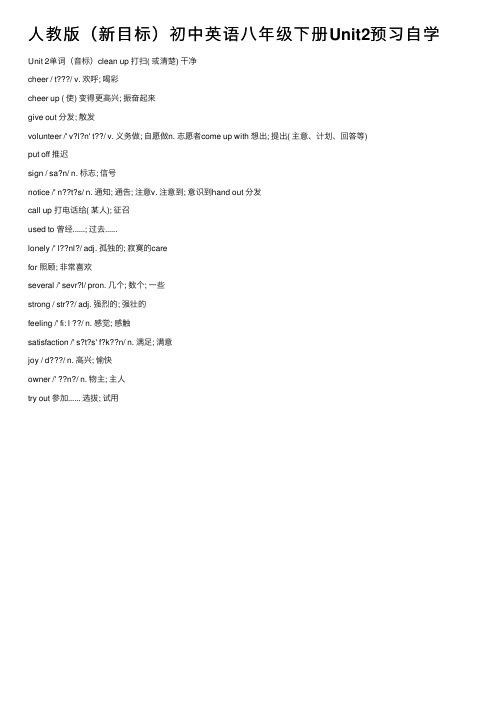
⼈教版(新⽬标)初中英语⼋年级下册Unit2预习⾃学Unit 2单词(⾳标)clean up 打扫( 或清楚) ⼲净cheer / t/ v. 欢呼; 喝彩cheer up ( 使) 变得更⾼兴; 振奋起来give out 分发; 散发volunteer /' v?l?n' t??/ v. 义务做; ⾃愿做n. 志愿者come up with 想出; 提出( 主意、计划、回答等)put off 推迟sign / sa?n/ n. 标志; 信号notice /' n??t?s/ n. 通知; 通告; 注意v. 注意到; 意识到hand out 分发call up 打电话给( 某⼈); 征召used to 曾经......; 过去......lonely /' l??nl?/ adj. 孤独的; 寂寞的carefor 照顾; ⾮常喜欢several /' sevr?l/ pron. ⼏个; 数个; ⼀些strong / str??/ adj. 强烈的; 强壮的feeling /' fi: l ??/ n. 感觉; 感触satisfaction /' s?t?s' f?k??n/ n. 满⾜; 满意joy / d/ n. ⾼兴; 愉快owner /' ??n?/ n. 物主; 主⼈try out 参加...... 选拔; 试⽤journey /' d??: n?/ n. ( 尤指长途) 旅⾏; ⾏程raise /' re?z/ v. 募集; 征集alone / ?' l??n/ adv. 独⾃; 单独repair / r?' pe?/ v. 修理; 修补fix / f?ks/ v. 修理; 安装fix up 修理; 装饰give away 赠送; 捐赠take after ( 外貌或⾏为) 像broken /' br??k?n/ adj. 破损的; 残缺的wheel / wi: l/ n. 车轮; 轮⼦letter /' let?/ n. 信 ; 函Miss / m?s/ n. ⼥⼠; ⼩姐set up 建⽴; 设⽴disabled / d?s' e?bld/ adj. 丧失能⼒的; 有残疾的make a difference 影响; 有作⽤blind / bla?nd/ adj. 瞎的; 失明的deaf / d ef/ adj. 聋的imagine / ? ' m?d??n/ v. 想象; 设想difficulty /' d?f?k?lt?/ n. 困难; 难题open/' ??p?n/ v. 开; 打开door / d?:/ n. 门carry /' k?r?/ v. 拿 ; 提 ; 扛train / tre?n/ v. 训练; 培训excited adj. 激动的; 兴奋的training /' tre?n??/ n. 训练; 培训kindness /' ka?ndn?s/ n. 仁慈; 善良clever /' klev?/ adj. 聪明的; 聪颖的understand /' ?nd?' st?nd/ v. ( understood) 理解; 领会change v. & n. 变化; 改变interest /' ?ntr?st/ n. 兴趣; 关注; v. 使感兴趣; 使关注sir / s?:/ n. 先⽣( ⽤于正式信函中对不知名的男性收信⼈的称呼时, 写为Sir) madam /' m?d?m/ n. 夫⼈; ⼥⼠( ⽤于正式信函中对不知名的⼥性收信⼈的称呼时, 写为Madam)Mario /' mereo/ 马⾥奥( 男名)Jimmy /' d??m?/ 吉⽶( 男名)unit2教材I’ll l11l 1 t€3 CILJT1 €t?1thc? c-ity p?rfis.LookstthewxysyoucoMdheppeople?ntReI hope to workourside.hclp to cleon up theWe girl could visit the sick kids in the hospital to cheer them up.the boy could give out food at the fond bank.The girl could volunteer in an after-school study program to teach kids. The boy could help to clcan up the city parks.4: \‘\é seed to come up with a plan For the City ParL plc an-Up D1y.B: Let‘s have lunch first.A: No, we need to start now. Cileari-Up Ray is cinly tive? weeks from now.A group of students are planning a City Park Clean-Up Day. Lieten and check (R) the thinge they are going to d? i? uu people abovst It.Listen again. Flll in the blanks.1. We need toa plan to tell [People abotit the city2. Clean-Up Day is only two weeks trom race'. We can’t making a plan.3. We couldsigns.4, Let’s make some notices, two. Then I'll them after school. 5. We could each 10 students and ask them tc? come. MaUksaconvereeWon u8ingcLe]nforrmationlnka:rndkb.Role-play the conversation.Helen: F 4i, Tom. I’m making some planx to svork in an old people’s home thisummer.Tom: Really 1 did that last summer!Helen: Oh, what did they ask you to help cout with?Tom: Mm things like reading the newspa P er to the old people, or justtalking to them. They told me stories about the post and how things used to be.Helen: That sounds interesting.lom: Yeah, a lot of old people are lonely. ¥S'e should listen to them and c.are forem.Heten: Yo u’re right. 1 mean, we’re all going to be old one day, too.I‘ll help to clean up the city parks. - UNIT 2 - Read ttie axttcte. Wbat do Syria aod ?€azy volunteer to dotStzzdezzts Who voJuzzteerMario C?reen and 2vlary Brown from Riverside High School give up severalhourn each week to help others.Mario lovcs animals and wants to be an animaldoctor. He volunteer.s at an anim al hospitai everySaturday morning. Mario believes it can help him -to get his future dream job. ”It‘s hard work,” he says,“ t? ut 1 want to learn more about how to care foran inn.Els. I get such a strong feeling of satisfactionwhcn I sec the animals get better and the look ofjoy on their c?wner?’races."Mary is a book lover. She could read by herself at the age of four. Estyear, she dccidcd to try out for a volunteer after?school reading program.Fhc rti)l 'nrks there nnre .1 weelt Eo helpkids leart? tc read. ‘The kiJ* are sitting inthe library, but you can see in their eyes thatthey're going on a different journey witheach new be ep yrpj untccring here is a dreamcome true for inc. I can d?i what I love ter doand help others at the same tiiii??,“,- xItead tbe azttctc agala and szzswer tbe qoesttoos.I.Why do Mario arid Mary volunteer to help others?2. What do they say a1?out volunlecr ingUae Izzi?zzitivca to complete the serstexzcee b elow.I . Mario wr?uld like an nnimal doctor.2.Mario works for an animal ht?spital because he wants about3.Mary decided for a job at an after-school reading program lastyear. She still works there now kids learn to read.4.Mary has a dream job because she can do w'hat she lovesUNIT 2I’d tikéto help h omeless people.She decided to tr/ ouE for a volunteerafiei-tool reading! Ypu covld ask hospitals to l et you visit Maiio believes it can help him to get his the kids and cheer them up, future dream job. She valunteers thete once a week to l?elp I'm making some signs to put up around kids learn to read. the school.PPM to tbe blazztca wttb tbe pfzraaaJ verhe in tJze hox.put.up 1.1 \vartt to my plan to work in an animal hospitaluntiJ next summer. I'm too busjr with my studies this year.hand our 2. She hopes to at )east five primary schools to ask if call up. they need volunteers for their after-school programs. cheer up 3. Our class is trjring to some ideas tocorrie up with sick children because they are often sad.Qivc o ut 4. We decided to signs around the school andput of? notices to tell students about the book sale. Wewill the rrtoney from the sale to homeless people. PIII la tlze h1anka wttk tke cozzect /orzoa oftise'?rec be In tha boz.help move do make visit spendMost people today are only worried about getting B ood jo bs _ _ lots of money. In their fine time, they think about what _ for fun. However, few people think about what they can dn _ _ others. There are m any people who are less lucky than us. Volunteerin g our time to help these people ix a good w'ay _ _ our free tlme. For example, we can make planssick children in the hospital or raise money for homeless people. Some people even stop dning their jobs for a few months to a year to another place, like one of the countries in Afrinn, and help people there.I.1’d like to volunteer2.At 12:00 a.m., t called my friend3.I’m very busy but I could help4.Summer vacation is coming, and I want5.I want to travel alone. My parenii told me (not)I“II help to clean up the c t'/ parks. UNIT ZMatch the sentences with similar meanings.b 1. I‘ve run On1 Of it. a. I rep.aired it.2, I take akcr my mother. b. I clot?’t I?ax'e any fzsore u?it.3. I fixed it up. c. 1’m similar to her.* 4. 1 gave it away. d. 1 didn’t keep it.Match the plixasal verbs with the nouns. Then make sentences with theLlsten end number the pictures (1-4) In thc correct order.Lfstczs agato. Cfr?tc. 3- For zrue or 6 For £eI?e.1. Jimm)' fixes up broken bicycle parts, like wheels.T F2. Jimmy sells bikes.T F3. ]imm y tnLes after his mother.F4. Jimmy has run out of money."I’FRole-play a cozzversaUozz between /tmzoy and tbe reporter. Use the tnformatton in 1c and Id.ft: What do you do, Jimmy? B: I fix up ...How do you usually thank someone who helps you? Discuss thts with apartner.Skizn tbe Eetter and anawer tbe queeoons.1, R’ho wrote the letter to Miss Li? Why ? 2. ¥Vhat did Miss Li do?pDcar Miss Li,I‘d like to thank you for giving money to A nimalotnJ canHelpers. I‘m sure you know that this group svas set up to hel P disabled people like me. You helped to make it possihlc for me to have Lucky. Lucky makes a big difference to my life. let me tel) you my story.'\Ahat would it be like tu be bli?1?t or ileal? Or imagine you can’t walk or use your hands cmsil)'. Most people would never think abuut tliix, but many Jseople hns?e th Esc ?difficulties. I can‘t use my arms or legs svell, so normal things like answering the telephone, opening ancl closing doocs, or carrying things are difficult for me. Then line d.ay last year, a friend of mine helped me out. i?he talkCd to Animal Helpers about gettin 8 me a special trained dens. Shc a)so thought a dog m ight cheer me up. I love animals and I was excited about the idea of having a dog. After six months ot twining with a dog at Animal Helpers, I was able to bring himhome. My dog‘s name is Lucky — a good name for him because 1 f eel very lucky to have him. YOu see, l‘iti only able to hn-e a ‘dog hdper” because of your kindness! Lucky is very clever and understands many English words, He can understand me u?hen I give him orders. For iixample, I say, ‘Lucky! Get my book,” and he does itat once.I. ucky ix a fantastic dog. I’ll send you a photo ofhim if you like, and I could shosv you how he helps rue. Thank you again for changing my life.'i .Best yr ixhes,Ben SmithBen SmithI’ll help to clean up the city parks - - UNIT 2LooL at tke 1iaC o£worda betow. *Ctrl tbe pazt ofspeecb o:E each wozdand zoake yoor own scnteszces wit tbese worda.1. grtiup ( adj. / n. )2. disabled ( adj. f e?v. )1. difference ( adv. / n. )4. imagine ( v. / n. )S. difficulties ( n. / ad). )6. normal ( adv. / adj. )7. training ( adv. / a. )8. kindness ( n. / v. )L/ge tbe irzformattozt iat Use letter to zoake trzse sentcaccs by'zaatchtag e dtfEorertt azC8.SUBJECTAnimal HelpersVERBunable to move well.money to Animal Helpers. anirrials like Lucky,things for disabled people.LooR at these kinds of volunteer work. Can you add more? What wouldyou like to do* Dtacuaa it with a partner. ? Worlting in an old people‘s homeHelping kids in an after-school program Being a guide at a museum1. In what other ways do you think dogs are able to help people ?2. Vt'hat other animals can we train to help people ?Unit2 知识梳理【重点单词】clean up 打扫(清除)⼲净cheer [t?i?] v. 欢呼cheer up 变得更⾼兴,振奋起来give out 分发,散发volunteer [?v?l?n?ti?] n. & v. 志愿者;义务做come up with 想出,提出put off 推迟sign [sa?n] n. 标记,符号,标牌notice [?n??t?s] n. & v. 通知,公告;注意到hand out 分发call up 打电话给…某⼈,征召usedto do sth. 过去常常做某事lonely ['l??nl?] adj. 孤独的,寂寞的care for 照顾,⾮常喜欢several [?sevr?l] prep. ⼏个,数个,⼀些strong [str??] adj. 强壮的,强烈的feeling [?fi:l??] n. 感觉,感触 satisfaction [?s?t?s'f?k?n] n. 满⾜,满意joy [d] n.⾼兴,愉快owner [n?(r)] n. 所有者,物主tryout 参加…选拔,试⽤journey ['d??:n?] n. (尤指长途)旅⾏,⾏程raise [re?z]v. 抬起,举起,筹集,征集alone [??l?un] adv. 独⾃地,孤独地repair [ri?p??] v. 修理,修补fix[fiks] v. 修理,安装fix up 修理,修补giveaway 赠送,捐赠take after (外貌或⾏为)像broken ['br??k?n] adj. 破损的,残缺的wheel [wi:l] n. & v. 轮⼦,车轮;旋转letter [?let?] n. 信件,字母Miss [m?s] n. ⼩姐set up 建⽴,设⽴disabled [dis?eib?ld] adj. 有残疾的,丧失能⼒的make a difference 影响,有作⽤blind [bla?nd] adj. 盲的,盲⽬的,失明的deaf [def] adj. 聋的imagine [??m?d??n] v. 想象,设想difficulty ['d?f?k?lt?] n. 困难open [p?n] v. 打开door [d?:] n. 门carry ['k?r?] v. 携带,搬运train [tre?n] v. 训练,培养training [?tre?n??] n. 训练,培训excited[?k?sa?t?d] adj. 激动的,兴奋的kindness [?ka?ndn?s] n. 仁慈,善良,亲切,善意clever [?klev?] adj. 聪明的,机灵的understand [??nd??st?nd] v. 懂,理解change [t?e?nd?] n. & v. 改变interest ['?ntr?st] n. & v. 感兴趣;兴趣sir[s?:(r)] n. 先⽣madam ['m?d?m] n. 夫⼈,⼥⼠【重点短语】1.C lean-Up Day 清洁⽇2.an old people’s home 养⽼院3.help out with sth. 帮助解决困难/doc/c5db8a53f58a6529647d27284b73f242336c3128.html ed to 过去常常......5.care for 关⼼;照顾6.the look of joy 快乐的表情7.at the age of 在...... 岁时8.c lean up 打扫(或清除)⼲净9.cheer up (使)变得更⾼兴;振奋10.give out 分发;散发/doc/c5db8a53f58a6529647d27284b73f242336c3128.html e up with 想出;提出12.make a plan 制订计划13.make some notices 做些公告牌14.try out 试⽤;试⾏15.work for 为…⼯作;为…. 效⼒16.put up 建造;举起;张贴17.hand out 分发;散发;发给18.call up 打电话;召集19.put off 推迟;延迟20.for example ⽐如;例如Unit2 I'll help to clean up the city parks.01 词汇讲解1. clean upclean up意为“打扫”,up为副词,此短语是动副型短语,如果宾语为代词,应放在短语中间;如果宾语是名词,可放于短语之间或两词之后。
- 1、下载文档前请自行甄别文档内容的完整性,平台不提供额外的编辑、内容补充、找答案等附加服务。
- 2、"仅部分预览"的文档,不可在线预览部分如存在完整性等问题,可反馈申请退款(可完整预览的文档不适用该条件!)。
- 3、如文档侵犯您的权益,请联系客服反馈,我们会尽快为您处理(人工客服工作时间:9:00-18:30)。
Unit 3单词(音标)rubbish [ ˈrʌbɪʃ] n. 垃圾,废物takeout the rubbish 倒垃圾fold[ fəʊld] v. 对折,折叠mess [ mes] n. 混乱,脏乱,食堂throw [ θrəʊ] v. 扔,投掷all the t ime 频繁,反复neither [ ˈni: ðə] pron. adv. 二者都不;也不shirt[ ʃə: t] n. 运动衫,衬衫as soon as 一… 就…,尽快pass [ pɑ: s] v. 前行,经过,批准borrow [ ' bɒrəʊ] v. 借,借用lend [ lend]v. 借给,借出f inger [ ˈ f iŋgə( r)]n. 手指hate [ heɪt]v. 憎恶,讨厌chore [ tʃɔ:( r)] n. 杂务,乏味的工作while [ wail] conj. 当... 时候,而,然而snack [ snæk] n. 小吃,点心,快餐stress [ stres] n. 精神压力,心理负担waste [ weɪst] v. 浪费,消耗in order to 目的是,为了provide [ prə' vaid] v. 提供,供给,供应anyway [ ˈeniwei] adv. 无论如何, 不管怎样,而且depend [ diˈpend] v. 取决于,依靠,依赖depend on 依靠于develop [ dɪˈveləp] v. 发展,壮大,开发,研制independent [ ˌ indiˈpendənt] adj. 独立自主的,不受约束的independence [ ˌ ɪndɪ' pendəns] n. 独立fair [ fɛə] adj. 公平的,公正的unfair [ ˌʌnˈfeə] adj. 不公平的,有偏见的fairness [ ˈ feənɪs] n. 公正性,合理性since [ sɪns] conj. 因为,既然neighbor [ ˈneɪbə] n. 邻居take care of 照顾,处理i l l [ i l ] adj. 生病的,有病的drop [ drɔp] v. 落下,跌落unit 3课本教材ß: Yes, sure. Can you do the diihefił fi: Well, c‹suld you please dv them?1.do the diW LisŁn o>t tlio<bsla ş. foldp<cl»tn>4. awacp the ßoor5. mnkn your bed6. tlean the l lvłng roomÎ*in going to cleazi the Iżving zoora. 8: No problem.A: Could I use your computcr?8- Sorry. I’m going to work on it now.A: Well, could I watch TV IB: Yes, you can, but first you have to clenn your room.UNI7 3Llcten. Feter anku hln father lf he cev dcfour thinga. Wbnt doez hia fatžier aay?Check (R) ycs oz norPeter wants’to... ’.Pet4'r’s fathe'r says ... ' Hb fatftsr's ’raasoris$o out for dinner. , W yes no I have to do some worlr.go to t he movies. yes no You have to clean your room. stay out late.gct a ridmyea no I necd to eat breažcišst.yes no You have a basketball game.6žeteo a Wby does Peter*s £atžzer aay ”tzo”7Qraw Ižcee to the reasons žo the čbezt in 2a.Makn convernntions between Peter and hia father.Sister: Tony, could you please help out with a few things?brother: Could I at least finish watching this show?Sister: No. I think two hours of TV is enough for y ou!&rether Pine. What do you want me to do?Sistet: Could you take out the rubbish, fold the clothes and do the dishes? Brother: So much?Sister: Y es, because Mom will be backfrom shopping any minute now.And she won't be happy if she seesthis mess.8io th+r. But the house is already prettyclean and tidy!SiSter: Yes, well, it's clean, but it's not“mother clean"!• •• • • • • • • • Could you please ‹ lean your room? • • • • • • • • • • • • - • - - - • • • • UNIT 3 Reed the story and anawer the questions.1.Why was Nancy’s mom angry with her?2.Did they sc›lve the problem? How?Last month, our dog welcomed mewhen I camc home from school. Hewanted a walk, but I was too tired.I threw dpwn my bag and went to theliving room. The minute I sat down infront of the TV, my mom came over.‘Could you please take the dog for awalk ” she aslted.“Could I watch one show Jirst?‘ I asked.‘No!“ she replied angrily. ”You watch TV all the time and never help outaround thc h nuse! I can’t work all day and do housework all evening.”Well, I work all day at school, t‹rt›! I‘m just as tired as you rn e! " I shoutedback.My mom did not say anything and walked away. For one week, she did notdo any housework and neither did 1. Finally, I could not find a clean dish or • a clean shirt.The next day, my mom came home from work to find the house clean andtidy.“ \ Vhat happened?” ihe asked in surprise.”I'm so sorry, Mom. I finally understand that u•e need ter share the houseworkpRoad tkc sentences kelow. Uzzderltae tote aeatezzcea fzoza tbe sendtagthat incur the snme thing.1.Neither of us did any housework for a week.2.My morn came over as soon as I sat down in front of the 9’V.3.You’re tired, but I’m tired, too.Dectde wketber tize uadezkaed wox<ts kz the senteocea are is orzs‘3?ien wxtte aootberseoteoce uaiog tbe uoderlizscd wozzt in the otbez1.Could you take the dog for a walk? (noun) —• Z vulked home tram nchool. (verb)›uld I watch one show lirst?3.1 c-.an’t work all d ay.4.You watch TV all the time.S. “What happened?” she asked in surprise.A: Cc›uld you please bring a tent,Liu C hang *B- Sure. And cciuh) y‹ru pt •ase .. .?C: Sorry, 1 can’t. 1 hax•e to ,..UNIT 3Cóuld I go out for dinner wìth my friends? Could we g et something to d rink after the movies .. . . Could you please take the dog for a walk7Could ycu please take out the rubbish?S .u . n ..,.t ..h ..á..t shòu ....l .d . b . e .. O ...K. No…you c an t . Y ou have abasketball.ğäniè tomorrOK, but I want to w atch one șhow fłrsț,Yes, sme.Wxżt« R For regaeets P and the correct respozzce.For perœżeeiozzs. ten znatčb eačk one wźthCould I hang out with my friendsa. Yes, here yøuafier t he m ovie? ix Hmm How much do you n eed?‹ı. Yes, but don’t come back too late.4. Could yoø help rrie do the dishes? e, No, ł can’t. I cut my íìnger and I'm trying5.Còuld ynu And me s ome mm!not m pet if ø'e LPMtnthcbIanksinChecouveraaflon.A: I hate tu churos.B: Wc•lT, I hatc some chores toe, but I tikc other chorc•s. A: Really? Great ! I askț'ou to me with some chores then? B. What do you neećl help with ? A: ynu please my clnthcs For me?'8: I don‘t warit to do that ! It’s boring! n: OK. 2lien you do the dishes for me ?B: Sure, no problem. But we go to the movies after that?A : pure. I’ 11 finish my homevs'urk while you help me wit h the dishes. Theri u•e CalE ßO to the movies.Make a list of thingø your group needa tø do +G•dO lł6îFor a campłzt g tctp. Œhez t dżsctss s who wilt Âo bri ” a tint Liu 'tbeæ and complete ttte cbaxt.1. buy some drinks and snacks I _ 5. go to the store2. borrow somemoney6. use your CD p!ayer 3. clean your room7. take out the rubbish _ 4. invite my friends to a party8. make your bedUke the phraaes 1s la to makn convecontiona.Paient:.CöuJd:'you clean Clilld: Yes, I can.Chlid: Gould 1 invite my friends to a party?Parem: No; you can't have a party. Yephave a test on Monila y.Ltatcn to a converoatioo between Sandy and hier moon. Check (c'•) the things In la that you hear.What are they going.to’do7.!’Sandy s mobi ?and'/ and D”ave• • • • ° ° C ould you please clean your room? • • • • • • • • • • • • • • • • • • ° • • UNIWbet do teeangera elk tbetrpazeats' perzoïgatozt kort Wfznt do pazeots sak tkefr teanagezato do? Wztte persx¢s or ¢scxogcrsaext to eacb pbzase.: C ld yo please take out the rubbish?B: Yes, sure.UNIT 3Dlscusa the questànns with jrour partner.1.¥h'hat do you uftcn do tu liclp your parents at hor rte ?2.Do you think kids should help out with chères at home ?The Sunday 4ail ma gazin e Invited parents to write about whether they thuxk young people should do chores at home. Skim the following letters. Which one agreea arid which one dieagreesiDear SirI do not understand why some parents make tlneir kids help with houxcwt›rk and ch‹rres at home. Kids th days already have enough stress from school. they do not have time to study and do housev•-ork, too. Housework is .a iv.aste of their time. Could we ju.st let them do their job as snidetits ? They 3hould ' spend their time on schoolwork in order to get good SiteThis means Iookiz›g quickly through a piece of writfng to fînd the main idea withoute good idea to read the firstgrades and get into a good university. Also, w'hen they getolder, they will have to do housewnrk so there is' to provide a clean and comfortable environment athome for their children And anyway, I think doingchores is not so difficult. I do not mind doing them.s I‹k r4i*I.•Dear Sir,I think it is important for children to learn how to do chores and help theirparents with housework. h is not enough to just get good grades at schooLChildren these days depend on their parents too much They are always asking, "Could you get this for me?" or"Could you help me with that?” Doing chores helps to develop children’s independence and teachn them how to look after themselves. It also help»them th understand the idea of farms Since they live in one house with their p arents, they should know thnt everyone should do their part in keeping it clean and tidy. Our neighbors’son got into a good college but during his first year, he had no idea how to take care ofhimsélf. As 1 reault, he o4Yen fell ill and his g rades dropped be earlier kids l earn to b e independent, the better it is for their future.Mr. Smith1 . ¥V hich letter do you agree with? Why?J. Vhat Wt2l2 d yUU xay tCf fiht? ptirS£lFl W)3O WCOtethe letter you don“t agree with ?•••••-••••Could you please clean your room? •••••••••••••••••••••UNIT 3 According to Ms. Mil)er and Mr. Smith, what are the pros and corxnabout kids doing chores IProsDoing chores helps †o developchildren‘s independence.Housework is a waste of children'sWz?te axle sezztezzce witJz eactz pbzaee trozzi tfze tetterB.1.a waste of time2.there is no need for ... to3.do not mind4.spend time on5.in order to6, it is not enough to* the carli‹•r ... the betterDiscuss cbe queetJona wttb a partner.Do you thtnk children ahotild do some chores at home? Why or whyChildren should d o c hores Children should riot dobeceusa ... choras because ...Unit3 知识梳理【重点短语】1.go out for dinner 出去吃饭2.stay out late 在外面待到很晚3.go to the movies 去看电影4.get a ride 搭车5.work on 从事6.finish doing sth. 完成做某事7.clean and tidy 干净整洁的8.dothe dishes 洗餐具9.take out the rubbish 倒垃圾10.fold your/the clothes 叠衣服11.sweep the floor 扫地12.makeyour/the bed 整理床铺13.clean the livng room 打扫客厅14.no problem 没问题15.welcomesb. 欢迎某人e home from school/work放学/下班回家17.throw down 扔下18.sit down 坐下e over 过来20.take sb. for a walk 带某人去散步21.all the time 一直;总是22.all day/evening 整曰/夜23.do housework 做家务24.shout back 大声回应25.walk away 走开26.share the housework 分担家务27.a comfortable home 一个舒适的家28.in surprise 惊讶地29.get something to drink 拿点喝的东西30.watch one show 观看一个节目31.hangout 闲逛32.pass sb. sth. 把某物传给某人33.lend sb. sth. 把某物借给某人34.get sth. wet 使某物弄湿35. hate to do sth. 讨厌做某事36.do chores 做杂务37.help sb. (to ) d o /with sth•帮助某人干某事38.bring a tent带顶帐篷来39.buy some snacks买些小吃40.go to the store去商店41.invite sb. to a party邀请某人参加聚会42.make sb. do sth. 使某人做某事43.enough stress足够的压力44.a waste of time浪费时间45.in order to为了46.get good grades取得好成绩47.mind doing sth. 介意做某事48.depend on依赖;依靠49.develop children's independence发展孩子的独立性50.look after/take care of 照顾;照看51.do one's part in (doing ) sth. 做某人分内的事【重点句型】1.C ould you please clean your room? 你能打扫一下你的房间吗?2.I have to do some work. 我必须干些活。
